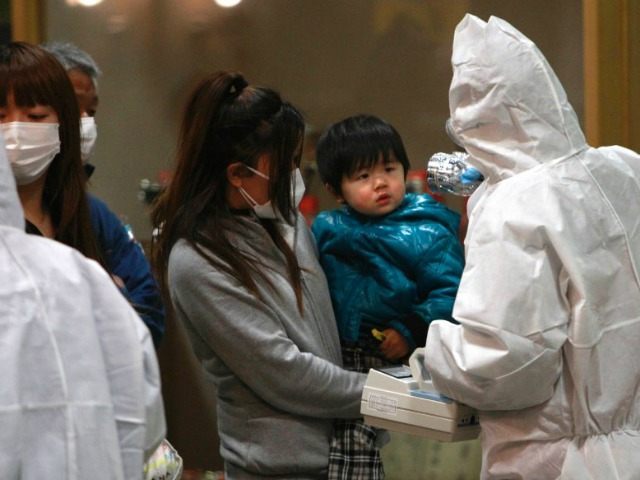Given the option of leaving their hometowns or risking radiation poisoning five years ago, families living near the Fukushima radiation disaster are falling apart, facing divorce, suicide, and cancer. The breakdown of Fukushima families comes as Japan faces a dwindling population it continues to struggle to replenish.
Mothers desperate to save their children from cancer or other side effects of radiation poisoning have been forced to choose between their husbands and their children, an in-depth report in Japan’s Asahi Shimbun notes. Many men stayed in the radiation-affected areas, unable to find jobs elsewhere. The mothers who moved as far from the Fukushima Daiichi nuclear plant as they could afford say they made the decision to save their children from radiation, but have lost their husbands and families.
One woman tells the Asahi Shimbun that her husband mailed her divorce papers in 2014 after she fled the area in 2011. “I cannot send money to my family whom I cannot see,” he said in a letter. She has not told her two children their parents are divorced. She made the choice to risk her marriage, she said, because she “could not trust the data released by the central government.” She laments, “My family has collapsed.”
Residents of Fukushima were forced to evacuate the area after a March 2011 earthquake and subsequent tsunami caused a meltdown at the Fukushima Daiichi plant. The plant’s operators expect it to take up to 40 years for the site to be fully safe and usable again.
The new Asahi profile of Fukushima mothers reflects similar fears the Japan Times found in speaking to others who had fled and refuse to trust the government’s assurances that their hometowns are safe. In September 2015, the newspaper spoke to mothers who said on the condition of anonymity that their families – especially their husbands’ families – were pressuring them to risk exposing their children to radiation to keep families together. “Consciously or subconsciously, women are aware of the role we are expected to play in a family. After the earthquake and nuclear disaster, however, everything changed. … I can’t live up to those expectations any more, and society judges me,” a woman identified with the pseudonym Yukiko said. “Some were accused of abandoning or running away from their families, particularly those they married into. Relatives labeled the wives disloyal and overly sensitive,” The Japan Times noted of others who fled. Those judged harshest are the ones fleeing areas for which the government issued only a voluntary evacuation order.
Those who stayed face the opposite fear. “Sometimes when I’m alone in the house, I start to cry, imagining the future of my children,” a woman identified as Hiroko said. “I fear my children may become sick, and the ones who I love most will hold a grudge against me for failing to protect them. That is my biggest fear.”
Those who fled to neighboring towns fear radiation so much they refuse to allow their children to eat food they know has been produced in any part of Fukushima prefecture. The Asahi report highlights one mother who sends her 11-year-old to school with a specially made bento box, refusing to allow the school to feed her Fukushima-produced rice and vegetables. The girl has been bullied as a result, her mother mocked for being “neurotic.” A school official noted that other mothers make their children “wear surgical masks when they participate in footraces during outdoor school athletic meets.”
Asahi estimates that 70,000 people remain prohibited from returning home due to the Fukushima disaster, and another 18,000 have voluntarily chosen not to return.
Those who stay must live with the fear of radiation and the absence of those who do not return. Officials have marked a surge in suicides directly tied to the Fukushima disaster. Asahi reported in December 2015 that police confirmed 19 suicides in 2015 related to the disaster, up from 15 in 2014. A total of 154 people are believed to have resorted to suicide as a result of the aftermath of the Fukushima disaster.
Masaharu Maeda, a professor of disaster psychiatry at Fukushima Medical University, says torn families can account for many of these suicides and a significant rise in depression and other psychological problems in these communities. “The elderly may return to their homes, but the generation who are still raising children do not return, meaning families are torn apart,” he noted.
In one of the most prominent suicide cases related to Fukushima, a 102-year-old man hung himself after being told he would have to evacuate his home in 2011. The family sued the Tokyo Electric Power Co (TEPCO), which runs the plant, for 60 million yen ($485,000).
Mothers who fear radiation poisoning have been vindicated by a number of tragedies following the 2011 meltdown at the Fukushima Daiichi nuclear reactor. Doctors in the region have found that children living in the area are 20 to 50 times more likely to develop thyroid cancer. The government confirmed the first cancer case related to the plant’s collapse in October 2015, a former nuclear plant worker who was diagnosed with leukemia.
The combination of family collapse and surging cancer cases is threatening an already dwindling Japanese population. Japanese officials have estimated that the population will diminish from 100 million to 80 million by 2065, leaving the nation without a reliable workforce. While some legislators have suggested making immigration to Japan easier, most appear reluctant to take that avenue. Raising the native birth rate would require significant cultural changes, many speculate, because of a Japanese work culture that pushes women to forego family life if they intend to keep their careers. Twenty percent of young mothers report experiencing harassment in the workplace, and many who wish to be mothers are encouraged to avoid pregnancy or abort.

COMMENTS
Please let us know if you're having issues with commenting.